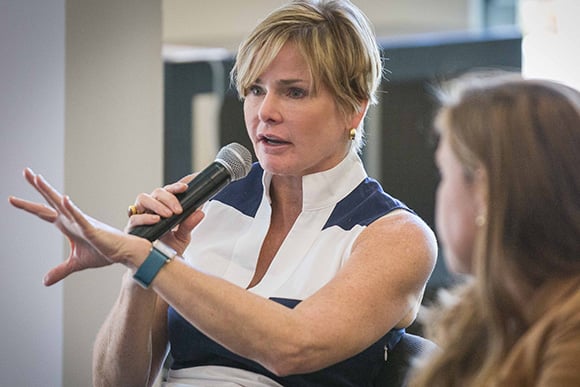 Saketh Guntupalli, MD, assistant professor of Obstetrics and Gynecology in the CU School of Medicine, talks during an Aspen Ideas Festival session about a potential new drug to boost women's libido. Photos by Matt Kaskavitch, University Communications.
Saketh Guntupalli, MD, assistant professor of Obstetrics and Gynecology in the CU School of Medicine, talks during an Aspen Ideas Festival session about a potential new drug to boost women's libido. Photos by Matt Kaskavitch, University Communications.
Editor's Note: In August, the U.S. Food and Drug Administration approved flibanserin, which will be sold as Addyi, for the treatment of sexual dysfunction in pre-menopausal women. This article pertains to a panel discussion about the drug that took place two months earlier, at the Aspen Ideas Festival in June.
ASPEN, Colo. (June 26, 2015) -- The promise of improved sexual function, set in motion 17 years ago with the Food and Drug Administration's approval of the male erectile dysfunction drug Viagra, is behind the push for a new drug that could boost women’s libido.
But questions about the safety and efficacy of the drug, flibanserin, which has been in development for decades and has gone before the FDA three times, loom as it nears final approval.
A panel featuring CU School of Medicine Assistant Professor of Obstetrics and Gynecology Saketh Guntupalli, MD, discussed the topic, “Does Women’s Viagra Turn You On,” as part of the Aspen Ideas Festival’s Spotlight Health series on June 26. The CU Anschutz Medical Campus and its partners -- the CU School of Medicine, University of Colorado Hospital and Children’s Hospital Colorado -- were presenting underwriters of this year’s series.
 The June 26 panel discussion featured, from left, Paula Johnson, MD, professor of medicine at Harvard Medical School and executive director of the Connors Center for Women's Health and Gender Biology; Saketh Guntupalli, MD, assistant professor of Obstetrics and Gynecology in the CU School of Medicine; and Ruth Katz, executive director of the Health Medicine and Society program at The Aspen Institute.
The June 26 panel discussion featured, from left, Paula Johnson, MD, professor of medicine at Harvard Medical School and executive director of the Connors Center for Women's Health and Gender Biology; Saketh Guntupalli, MD, assistant professor of Obstetrics and Gynecology in the CU School of Medicine; and Ruth Katz, executive director of the Health Medicine and Society program at The Aspen Institute.
The discussion also featured panelist Paula Johnson, MD, professor of medicine at Harvard Medical School and executive director of the Connors Center for Women’s Health and Gender Biology, and moderator Ruth Katz, executive director of the Health Medicine and Society program at The Aspen Institute.
As one might expect on such a subject, the discussion was lively, informative and at times entertaining. It also touched on the wider topic of inequities in research on women’s health issues.
Very different from Viagra
Guntupalli stressed that the drug flibanserin works in very different ways than Viagra. Viagra keys on the physiological problem of achieving an erection rather than psychological issues, because with men, sexual desire generally isn’t the problem.

Flibanserin, conversely, works on the brain through serotonin receptor pathways. “It helps women overcome hypoactive sexual disorder, or the inability to have desire,” Guntupalli said.
He noted that side effects suffered by some participants in the clinical trials included dizziness, nausea and fainting. Overall, the trials showed that women experienced increased libido as well as “satisfying sexual events,” which in women tend to be subjective.
Guntupalli said he had contacted Sprout Pharmaceuticals, the maker of flibanserin, about the possibility of conducting a clinical trial with some of his patients. Guntupalli specializes in care of women with gynecologic pre-cancer and cancers -- the latter group being especially vulnerable, because of cancer treatments, to problems with libido.
In general, he said, 40 percent of women suffer from some form of sexual dysfunction, which can adversely affect their relationships. “We do have to address it, but I think we need to address it in a responsible way.”
Johnson said that although more data has been collected through flibanserin trials, some concerns persist.
'All about choice'
Guntupalli said he always asks his patients the question: “Does this (problem with sexual function) bother you in your life?” If not, then the discussion about a sexual-function drug is moot.
“There is kind of this dichotomy within this movement that we have to push this drug, we have to address this,” Guntupalli said. “But it’s all about choice. … We should not be pushing this drug on women who don’t want to engage in sexual activity just because as a society we’ve decided that this is such a huge problem.
“For women where (sexual dysfunction) is an issue,” he said, “It’s something that needs attention and it needs to be addressed – safely.”
Guntupalli said data from the NIH and shows that women tend to be underrepresented in disease studies in general, and that needs to change.
Guntupalli and Johnson both said that multifaceted, individualized approaches to care are necessary rather than simple prescriptions for a pill. More concerted work on women’s health issues is needed in general, Johnson said.
Aspen Ideas Festival
The University of Colorado Anschutz Medical Campus was a presenting underwriter of the 2015 Aspen Ideas Festival’s three-day Spotlight Health series. Leading physicians and scholars from the CU Anschutz Medical Campus shared their insights and research with 1,000-plus attendees from June 25-28.
 An audience member asks the panel a question during the Q&A session.
An audience member asks the panel a question during the Q&A session.
The high-profile Spotlight Health forum is an ideal platform on which to raise the profile of the CU Anschutz Medical Campus.
"The festival takes place in Aspen, our own backyard, and attracts attendees from around the country and the world," said Leanna Clark, vice chancellor of University Communications. "The Spotlight Health focus ensures that we are getting the Anschutz Medical Campus brand in front of the foremost academics, policy makers, practitioners, industry executives, philanthropists and concerned citizens, and engaging them in the conversation to transform health and health care.”
The Aspen Institute invited a group of "Spotlight Scholars" to attend the conference in recognition of their academic accomplishments and ability to translate ideas into action. Four scholars represented the CU Anschutz Medical Campus: Brandi Freeman, MD, assistant professor, Pediatrics-General Pediatrics; Jason Stoneback, MD, Department of Orthopedics; Roberta Capp, assistant professor, Emergency Medicine; and Christopher Porter, MD, assistant professor, Pediatrics-Hematology/Oncology.
Published June 30, 2015
Contact: Christopher.casey@ucdenver.edu
